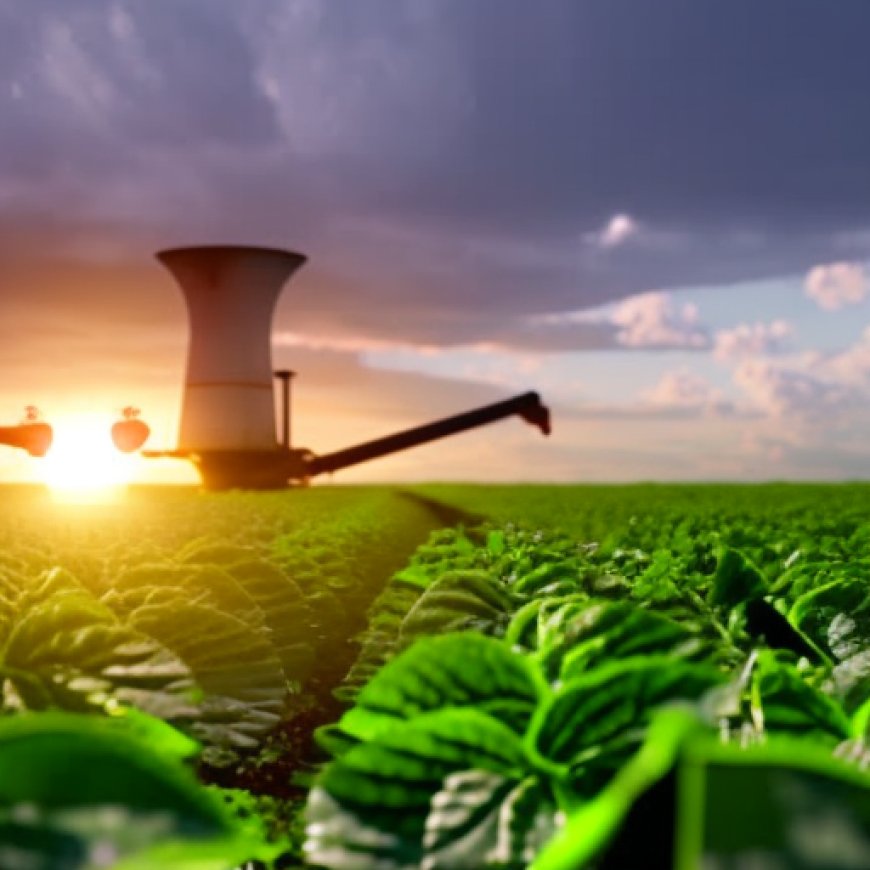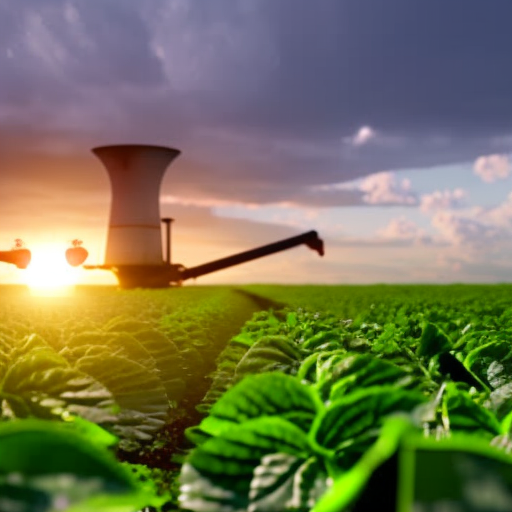International Zeolite to Validate NEREA(R)+ for Outdoor Crop Growth: A Revolutionary Breakthrough in Agricultural Technology
International Zeolite to Validate NEREA(R)+ for Outdoor Crop Growth: A Revolutionary Breakthrough in Agricultural ... Yahoo Finance


Vancouver, British Columbia–(Newsfile Corp. – March 8, 2024) – International Zeolite Corp (TSXV: IZ) (OTC PINK: IZCFF) (FSE: ZEON) (the “Company”), a pioneer in innovative, environmentally friendly solutions utilizing natural zeolite, proudly announces the completion of indoor greenhouse validation of its flagship plant-growing product, NEREA®
The Company has successfully completed the indoor greenhouse validation of its flagship plant-growing product, NEREA®, and is now moving forward with testing NEREA®+ on outdoor crops. The introduction of NEREA® and NEREA®+ has the potential to revolutionize the agricultural industry, benefiting farmers, growers, and the environment.
NEREA®: A Game-Changer for Crop Growth
NEREA® represents a significant advancement in agricultural technology. Extensive independent studies have demonstrated the remarkable benefits of NEREA® compared to conventional commercial growing methods:
- Dramatic Plant Growth Improvement: Crops cultivated in greenhouses with NEREA® exhibit accelerated growth, resulting in larger and healthier plants. This enhancement translates to increased revenue potential of up to 50% for growers.
- Cost Savings: By significantly reducing the need for fertilizer and water, NEREA® slashes operational costs. Independent research confirms that NEREA® lowers fertilizer waste and runoff by up to 90%. Moreover, water usage decreases by up to 30%, contributing to sustainable resource management.
- Enhanced Crop Quality: NEREA® not only boosts yield but also improves the quality of agricultural products. Plants mature more quickly, leading to shorter crop cycles and higher-quality produce.
- Environmental Sustainability: As a naturally occurring nano-structured mineral, zeolite forms the foundation of NEREA®. This substrate is environmentally friendly, minimizing waste and avoiding harm to ecosystems.
Research Validation
NEREA®’s benefits have been rigorously validated by leading agricultural research institutions. Trials conducted independently by Canada’s foremost experts confirm its efficacy in various critical areas:
- Faster Maturation: Crops mature more quickly, shortening growth cycles and increasing yield.
- Essential Nutrient Supply: NEREA® provides all necessary nutrients throughout the growth period for specific crops.
- Pathogen Resistance: By reducing plant infection from fungi, viruses, and other pathogens, NEREA® ensures healthier crops.
A Holistic Solution
NEREA® is more than just a product; it is a holistic solution that combines financial gains with environmental responsibility. By holding and gradually releasing nutrients and water to plant roots, NEREA® promotes soil sustainability while maximizing the efficiency of commercial agriculture.
Mark Pearlman, President & Chief Operating Officer of International Zeolite Corp., emphasizes the significance of NEREA®: “Our mission is to revolutionize crop cultivation. With NEREA® and NEREA®+, we empower farmers, nurseries, and controlled-environment agriculture (CEA) practitioners to achieve unprecedented results. Our investment in research and validation is critical to the commercialization of NEREA®. This spring, we have partnered with a large-scale Ontario commercial grower to validate NEREA®+ on outdoor cash crops, specifically soybeans. In the fall of 2023, IZ relocated its pilot plant to accommodate the upcoming trials.”
About International Zeolite Corp.
International Zeolite Corp. is committed to creating sustainable solutions for agriculture, industry, and consumers. As the exclusive North American licensee for NEREA®, the company is at the forefront of innovation, driving positive change in the global agricultural sector.
On Behalf of the Board
“Ray Paquette”
President & CEO
604.684.3301
For further information, please visit www.internationalzeolite.com
For Investor Inquiries info@internationalzeolite.com
Some statements in this news release contain forward-looking information. These statements include, but are not limited to, statements with respect to future expenditures. These statements address future events and conditions and, as such, involve known and unknown risks, uncertainties, and other factors which may cause the actual results, performance, or achievements to be materially different from any future results, performance, or achievements expressed or implied by the statements. Such factors include, among others, the ability to complete contemplated work programs and the timing and amount of expenditures. International Zeolite does not assume the obligation to update any forward-looking statement. Neither TSX Venture Exchange nor its Regulation Services Provider (as that term is defined in the policies of the TSX Venture Exchange) accepts responsibility for the adequacy or accuracy of this release.
SDGs, Targets, and Indicators in the Article
1. Which SDGs are addressed or connected to the issues highlighted in the article?
- SDG 2: Zero Hunger
- SDG 6: Clean Water and Sanitation
- SDG 12: Responsible Consumption and Production
- SDG 13: Climate Action
- SDG 15: Life on Land
The article discusses the innovative agricultural technology NEREA®, which has the potential to transform the agricultural landscape and benefit farmers, growers, and the environment. By addressing issues related to crop growth, cost savings, crop quality, environmental sustainability, and resource management, the article connects to multiple SDGs.
2. What specific targets under those SDGs can be identified based on the article’s content?
- SDG 2.4: By 2030, ensure sustainable food production systems and implement resilient agricultural practices that increase productivity and production.
- SDG 6.4: By 2030, substantially increase water-use efficiency across all sectors and ensure sustainable withdrawals and supply of freshwater to address water scarcity.
- SDG 12.4: By 2020, achieve the environmentally sound management of chemicals and all wastes throughout their life cycle, in accordance with agreed international frameworks, and significantly reduce their release to air, water, and soil to minimize their adverse impacts on human health and the environment.
- SDG 13.2: Integrate climate change measures into national policies, strategies, and planning.
- SDG 15.1: By 2020, ensure the conservation, restoration, and sustainable use of terrestrial and inland freshwater ecosystems and their services, in particular forests, wetlands, mountains, and drylands, in line with obligations under international agreements.
The targets identified are aligned with the specific goals mentioned in the article, such as sustainable food production, water-use efficiency, environmentally sound management, climate change integration, and conservation of ecosystems.
3. Are there any indicators mentioned or implied in the article that can be used to measure progress towards the identified targets?
- Increased revenue potential of up to 50% for growers (indicator for SDG 2.4)
- Reduction of fertilizer waste and runoff by up to 90% (indicator for SDG 12.4)
- Decrease in water usage by up to 30% (indicator for SDG 6.4)
- Improvement in crop quality and shorter crop cycles (indicators for SDG 2.4 and SDG 15.1)
- Environmentally friendly substrate minimizing waste and avoiding harm to ecosystems (indicator for SDG 12.4 and SDG 15.1)
These indicators mentioned in the article can be used to measure progress towards the identified targets, as they provide specific measurable outcomes related to sustainable food production, resource management, and environmental impact.
Table: SDGs, Targets, and Indicators
| SDGs | Targets | Indicators |
|---|---|---|
| SDG 2: Zero Hunger | 2.4: By 2030, ensure sustainable food production systems and implement resilient agricultural practices that increase productivity and production. | Increased revenue potential of up to 50% for growers |
| SDG 6: Clean Water and Sanitation | 6.4: By 2030, substantially increase water-use efficiency across all sectors and ensure sustainable withdrawals and supply of freshwater to address water scarcity. | Decrease in water usage by up to 30% |
| SDG 12: Responsible Consumption and Production | 12.4: By 2020, achieve the environmentally sound management of chemicals and all wastes throughout their life cycle, in accordance with agreed international frameworks, and significantly reduce their release to air, water, and soil to minimize their adverse impacts on human health and the environment. | Reduction of fertilizer waste and runoff by up to 90% |
| SDG 13: Climate Action | 13.2: Integrate climate change measures into national policies, strategies, and planning. | No specific indicator mentioned in the article |
| SDG 15: Life on Land | 15.1: By 2020, ensure the conservation, restoration, and sustainable use of terrestrial and inland freshwater ecosystems and their services, in particular forests, wetlands, mountains, and drylands, in line with obligations under international agreements. | Improvement in crop quality and shorter crop cycles Environmentally friendly substrate minimizing waste and avoiding harm to ecosystems |
Behold! This splendid article springs forth from the wellspring of knowledge, shaped by a wondrous proprietary AI technology that delved into a vast ocean of data, illuminating the path towards the Sustainable Development Goals. Remember that all rights are reserved by SDG Investors LLC, empowering us to champion progress together.
Source: finance.yahoo.com

Join us, as fellow seekers of change, on a transformative journey at https://sdgtalks.ai/welcome, where you can become a member and actively contribute to shaping a brighter future.







